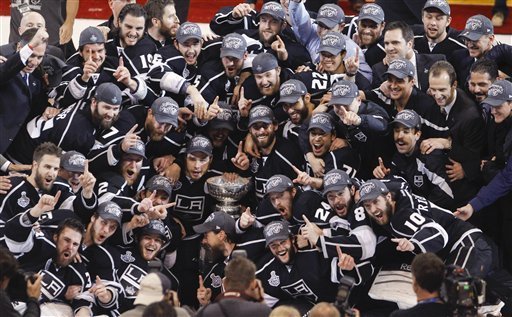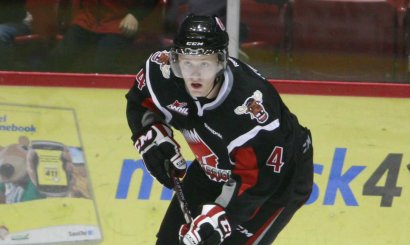 Ten months of grueling practices, late night plane rides, being away from the family, and three or more games a week has come to an end. Every player’s dream in September when training camp begins has become a reality for the Los Angeles Kings. Dustin Brown became just the second American-born captain to be instructed by NHL Commissioner Gary Bettman to come and get the Stanley Cup. What transpired was a celebration that gives every hockey fan, regardless of their allegiance, chills. Well, except for New Jersey Devils fans.
Ten months of grueling practices, late night plane rides, being away from the family, and three or more games a week has come to an end. Every player’s dream in September when training camp begins has become a reality for the Los Angeles Kings. Dustin Brown became just the second American-born captain to be instructed by NHL Commissioner Gary Bettman to come and get the Stanley Cup. What transpired was a celebration that gives every hockey fan, regardless of their allegiance, chills. Well, except for New Jersey Devils fans.
The Kings’ improbable Stanley Cup run reached its crescendo on Monday night when they finished off the Devils with an impressive 6-1 drubbing. Most of the doubt was removed early in the game when Devils forward Steve Bernier took a five-minute major penalty for boarding and a game misconduct when he hit Kings defenseman Rob Scuderi from behind. The hit followed a series of borderline dirty plays from the Kings in the neutral zone that went uncalled by the officials.
On five-minute major penalties, unlike two-minute minors, teams are on the powerplay for a full five minutes regardless of if they score or not. The Kings made the most of their opportunity, scoring three powerplay goals in four minutes to effectively put the game away. The Kings allowed three or more goals just three times in their 20 postseason games. With great defense and strong goaltending from Conn Smythe Trophy winner for the playoffs’ most valuable player Jonathan Quick, the run put together by the Kings is one of the most impressive ever. They went 16-4 in the postseason.
The first player to be handed the Cup from captain Dustin Brown was Willie Mitchell. Mitchell, a veteran of 12 years, had never hoisted the Cup before. In fact, just a couple years ago, Mitchell contemplated retirement due to concussions. Those are the types of players who you really feel happy for. They’ll be lucky to remember their skate with the Cup because it will be a blur, but they’ll forever remember their day with the Stanley Cup, a reward that each player on the team gets to experience.
On the flip side, disappointment again for Zach Parise. Parise scored the game-tying goal in the gold medal game in the 2010 Winter Olympics against Canada, a game that Team USA would lose in overtime. For Parise, being runner-up again, following the rehab for a serious knee injury last season, is a tough pill to swallow. Teammate and Hall of Fame goaltender Martin Brodeur came up short and will probably not get back to the Stanley Cup Finals before he retires. Backup goaltender Johan Hedberg also comes up short in his bid for the Cup at age 39.
Now the focus in the NHL shifts to impending collective bargaining agreement talks, the draft, and free agency. The NHL’s collective bargaining agreement expires on September 15, but the players union is reportedly trying to bump the expiration date to June 30 to give the league and the players union more time to negotiate and avoid a lockout. Player safety and an escalating salary cap will be two of the issues at heart. The NHL instituted a salary cap after the lockout to help the owners with finances in a sport that has inconsistent attendance in some markets and no big television deal. The salary cap has gone up every year since and now sits around $65,000,000. The post-lockout salary cap was $39,000,000. Salaries have gotten out of control again and could provide future problems.
If the September expiration date of the CBA is bumped up to the end of June, it will be interesting to see what happens with NHL free agency, which is scheduled to begin every year on July 1. It’s hard to envision the NHL having free agency going alongside CBA talks, so the NHL offseason schedule could be drastically thrown off. If things aren’t taken care of quickly, the NHL could face an NFL-type situation with a very abrupt training camp and a hurried free agency period.
One thing that will definitely happen on time is the June 22 first round of the NHL Entry Draft in Pittsburgh, PA. So far, I have looked at defenseman Ryan Murray, forwards Mikhail Grigorenko, Filip Forsberg, and Alex Galchenyuk, and assumed that Nail Yakupov will go first overall. The likelihood of the Blue Jackets taking a player other than one of these four is slim to none, unless they trade down into the middle of the top ten to add more draft picks. However, a player on the fringe of the top five could sneak up the draft board, defenseman Morgan Rielly.
 Name: Morgan Rielly
Name: Morgan Rielly
Position: Defenseman
NHL Central Scouting Bureau Rank: #5 North American, #2 North American defenseman
Birthdate & place: Vancouver, British Columbia, Canada; March 9, 1994
Height, weight: 6’, 190
Shoots: Left
Like Alex Galchenyuk, Morgan Rielly’s draft stock took a hit when he suffered a torn ACL early in the 2011-12 season. Rielly missed five months of the Western Hockey League season and played just 18 games for the Moose Jaw Warriors. Rielly impressed scouts in those 18 games, recording 18 points, three goals and 15 assists. Rielly returned from his torn ACL in time to participate in the WHL playoffs, where he had three assists in five games against the Edmonton Oil Kings.
Rielly participated internationally at the 2011 Ivan Hlinka Memorial Tournament, where he won a gold medal with Team Canada and at the Under-17 Hockey Challenge where he won a bronze medal with Team Pacific.
Rielly is regarded as a strong passer and a very creative player that makes a good first pass out of the zone and likes to jump into the play. NHL Central Scouting’s Blair McDonald said of Rielly, “He’s like a chess player; he’s thinking one or two moves ahead. He sees stuff coming that a lot of other players don’t see.”
Analysis: Rielly could be the surprise of the 2012 draft class. Some scouts and GMs have Rielly rated higher than Ryan Murray because of Rielly’s offensive tools and questions about Murray’s offensive capabilities. It’s entirely possible that Rielly could be ranked higher than Murray without the ACL injury. Rielly and Murray are nearly identical in size and it’ll be a matter of if the Blue Jackets value offensive potential over defensive.
The more I see about Rielly, the more I like him. Where Murray is a strong, solid, dependable player, Rielly has more reward and more game-changing ability. The Blue Jackets have a similar player to Rielly in John Moore, but Rielly should have a higher ceiling.
Next week, I’ll be putting together a first round mock draft for all 30 teams as a preview for the 2012 NHL Entry Draft.